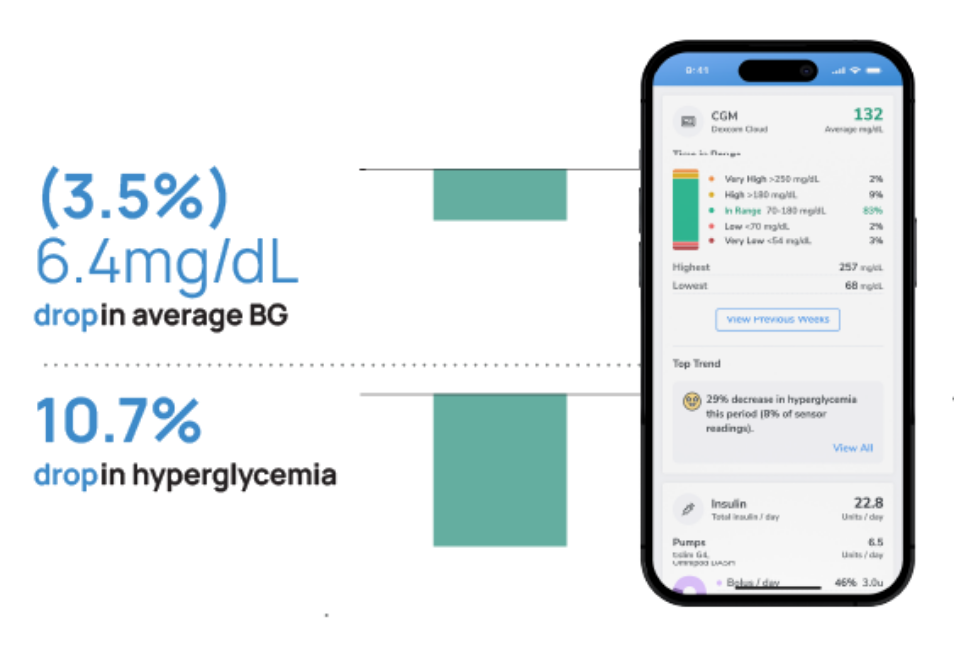Evidence-based diabetes management
Clinical benefits and improved health outcomes from Glooko
Multiple studies have shown that remote patient monitoring (RPM) powered by the Glooko diabetes management platform leads to immediate and lasting improvements in glycemic outcomes, demonstrating clear clinical benefits and better health outcomes for people living with diabetes.
Sustained reduction in HbA1c with Glooko through remote patient monitoring of patients with Type 2 diabetes
Reduction in HbA1c1,2

Sustained glycemic improvements as seen through remote patient monitoring powered by Glooko
Increase In-Range Blood Glucose3
Point increase of % readings in Time-in-Range (TIR) at:

Decreased Average Blood Glucose3

Decreased Hyperglycemia1,2


Use of the Glooko Mobile App
improved glycemic outcomes in 2 months
- Drop in average blood glucose levels and hyperglycemia
- Use of the Glooko Mobile App and its food logging and reminders
features improved glycemic outcomes
1. Sheng T et al. Glycemic Improvements Following Mobile-Enabled Remote Patient Monitoring: A Randomized Control Study, ADA Scientific Sessions, June 2020. 2. Clements M, Duffee J and McCarther D. Remote patient monitoring for adults with type 2 diabetes. ADCES Research Sessions, August, 2020. 3. Sheng T, Parks L and Clements M. Remote patient monitoring in the real world: Immediate and long-term improvements in glycemic control. American Association of Diabetes Educators (AADE) Annual Meeting, Houston TX. August, 2019. 4. Offringa R et al. Digital diabetes management application improves glycemic outcomes in people with type 1 and type 2 diabetes. Journal of diabetes science and technology, 12(3), 701-708. 2018. 5. Sheng T et al. 2019. 6. Abad R et al. Use of mobile-enabled reminders feature is associated with improved behavioral and glycemic outcomes in the rel world. American Diabetes Association (ADA), Scientific Sessions, 2019. 7. Babikian S et al. Deteriorating Glucose Control in Patients with Diabetes after Disengagement from a Mobile Health App. Diabetes Technology Meeting, Poster, 2020.
Use of the Glooko Mobile App
improved glycemic outcomes in 2 months
mg/dL average increase in blood glucose
%
in-range readings
%
Hyperglycemia
*Remote patient monitoring in the real world: Immediate and long-term improvements in glycemic control. Sheng, T et al. American Association of Diabetes Educators (AADE) Emerging Science Poster, 2019
Clinical Evidence Findings
Explore data from our clinical studies
2025 Glooko Annual Diabetes Report
This annual report showcases how Glooko’s advanced analytics and billions of data points are driving personalized diabetes care by turning complex data into actionable insights, empowering clinicians and people with diabetes to make informed decisions.
Remote patient monitoring and glycemic control trends during the COVID-19 pandemic
This study analyzed remote patient monitoring usage and outcomes for more than 100,000 people with diabetes using Glooko during the COVID-19 pandemic, showing increased engagement, better glucose trends, and more self-monitoring.
The impact of remote patient monitoring on glycated hemoglobin for type 2 diabetes: a randomized controlled trial
mHealth and remote patient monitoring can improve diabetes care and outcomes, but limited research exists on scaling these solutions for Type 2 diabetes clinics. Glooko’s study found that a 24-week comprehensive RPM program significantly reduced HbA1c compared to usual care in adults with T2D.
Cost and outcomes of a diabetes remote patient monitoring system: a simulation analysis
Glooko’s health economics (HEOR) study used a simulation model based on a randomized trial to assess RPM and digital therapeutics for Type 2 diabetes. The intervention significantly improved HbA1c and, when modeled long-term, showed potential for reducing complications, mortality, and healthcare costs.
A virtual diabetes care model to improve self-management: an employee wellness program case study
Glooko and Cecelia Health partnered with a large Midwestern hospital system to offer a virtual diabetes support program for employees and their dependents. Over 12 weeks, participants received personalized coaching and used the Glooko app for self-tracking. The program showed strong engagement and led to significant A1C reductions and improved time-in-range.
Remote patient monitoring for adults with type 2 diabetes
In the study funded by Glooko, mobile-enabled remote patient monitoring with weekly monitoring and episodic telephonic coaching led to significantly improved A1C after 24 weeks.
Diabetes distress reduces over time among adults with T2D receiving care in an ambulatory diabetes clinic setting.
Type 2 diabetes often leads to emotional distress, which can hinder self-management and glycemic control. This study evaluated whether the Glooko remote patient monitoring program reduced diabetes-related distress compared to usual care in adults with Type 2 diabetes.
Immediate and sustained trends in glycemic control during remote patient monitoring in people with Type 2 diabetes.
Digital health tools like connected devices and mobile apps help manage Type 2 diabetes by enabling data sharing between patients and care teams. Remote access to this data allows providers to identify worsening glycemic control and deliver timely interventions between clinic visits.
Glycemic improvements following mobile-enabled remote patient monitoring: A randomized control study.
Mobile technologies and digital health tools, like connected devices and self-management apps, support diabetes care. This randomized control trial assessed the short-term effectiveness of mobile-enabled remote patient monitoring with coaching on glycemic outcomes in an ambulatory clinic setting.
Insulin pump usage patterns among persons with diabetes (PWD)
People with diabetes often face challenges in consistently managing their condition and matching insulin doses to needs. To support early intervention, a machine learning algorithm was developed to predict the risk of reduced time in range (TIR) after a clinic visit, using primarily data from clinic-uploaded devices.
Validation of a novel algorithm for interpreting glycemic control from CGM data
While continuous glucose monitoring (CGM) is valuable for diabetes management, interpreting the data can be time-consuming and subjective. Glooko’s algorithm offers an efficient, accurate alternative to clinician assessment, helping streamline treatment decisions.
mHealth enabled remote monitoring improves diabetes outcomes
Remote monitoring in diabetes is gaining attention from accountable care organizations (ACOs) as a way to improve care quality and reduce costs. Mobile health, or mHealth, solutions using data from patients’ diabetes devices can support population management, but research on their impact is limited. This pilot study covered using Glooko’s mHealth platform for remote management […]
A machine learning model predicts engagement with an mHealth-based RPM program among people with diabetes
Remote patient monitoring participants often disengage over time. To address this, a machine learning model was developed to predict the risk of declining engagement with the Glooko mHealth app for diabetes self-management. The model leveraged SMBG, demographics, and app usage to make predictions with a gradient boosting algorithm.
Use of mobile-enabled reminders feature is associated with improved behavioral and glycemic outcomes in the real world
Real-world challenges can hinder effective diabetes self-management. Mobile apps with reminder features for blood glucose checks and medications aim to support adherence, but their real-world impact remains unclear. This study evaluates whether using reminder features is associated with improved behavioral and glycemic outcomes in people with diabetes.
Diabetes management application improves self-care behavior and glycemic control
This retrospective study evaluated the clinical benefits of using a mobile health app to support self-monitoring in diabetes management. Findings showed that increased self-monitoring was linked to improved self-management, demonstrated by lower average blood glucose levels and more frequent glucose measurements.
Mobile health tool improves glycemia in people with T2D
Insulin management is often challenging for people with diabetes. This feasibility study assessed whether an mHealth app designed for long-acting insulin (LAI) dose adjustment could support appropriate titration and improve glycemic control in individuals with Type 2 diabetes.
Remote patient monitoring in the real world: Immediate and long-term improvements in glycemic control
Mobile-enabled remote patient monitoring can expand care access, improve outcomes, and lower healthcare costs. This study evaluated the effectiveness of RPM pilot programs in real-world diabetes clinic settings, focusing on their impact on glycemic control.
Mobile-enabled food logging is associated with improved glycemic management in the real-world
This study examined whether using an in-app food logging feature is linked to better glycemic outcomes, highlighting the role of diet in diabetes self-management.
Published Research
Explore the latest research referencing Glooko.
From diabetes care to prevention: review of prediabetes apps in the DACH region
Date: January 17, 2025

 Germany
Germany  Spain
Spain  France
France